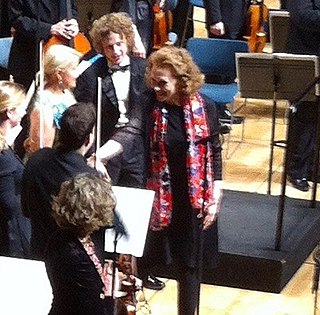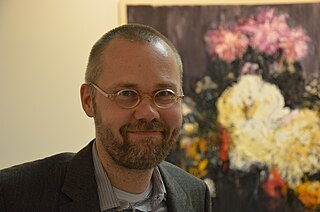The Finlandia Prize is a set of Finnish literary prizes awarded by the Finnish Book Foundation to "celebrate reading and highlight new Finnish first-rate literature." Considered the most prestigious in the nation, they are awarded annually in three categories: fiction, non-fiction and children's and youth literature. The prize was first awarded in 1984.

Kaija Anneli Saariaho was a Finnish composer based in Paris, France. During the course of her career, Saariaho received commissions from the Lincoln Center for the Kronos Quartet and from IRCAM for the Ensemble Intercontemporain, the BBC, the New York Philharmonic, the Salzburg Music Festival, the Théâtre du Châtelet in Paris, and the Finnish National Opera, among others. In a 2019 composers' poll by BBC Music Magazine, Saariaho was ranked the greatest living composer.

The Finnish Academy of Science and Letters is a Finnish learned society. It was founded in 1908 and is thus the second oldest academy in Finland. The oldest is the Finnish Society of Sciences and Letters, which was founded in 1838.
Derrick B. Jelliffe and his wife Eleanore. F. Patrice Jelliffe – known as Dick and Pat Jelliffe – were experts in tropical paediatrics and infant nutrition. They are most known for their seminal book, Human Milk in the Modern World, published by Oxford University Press in 1978, and for editing the multi-volume Advances in International Maternal and Child Health. The Jelliffes also wrote over 500 scholarly papers, often together, and 22 books. They lived and worked in England, Africa, India, the Caribbean and settled in Los Angeles, where he held the Chair in Public Health and Paediatrics at the University of California from 1972 to 1990.
Dannie Heineman Prize for Mathematical Physics is an award given each year since 1959 jointly by the American Physical Society and American Institute of Physics. It is established by the Heineman Foundation in honour of Dannie Heineman. As of 2010, the prize consists of US$10,000 and a certificate citing the contributions made by the recipient plus travel expenses to attend the meeting at which the prize is bestowed.

Ludvig Dmitrievich Faddeev was a Soviet and Russian mathematical physicist. He is known for the discovery of the Faddeev equations in the quantum-mechanical three-body problem and for the development of path-integral methods in the quantization of non-abelian gauge field theories, including the introduction of the Faddeev–Popov ghosts. He led the Leningrad School, in which he along with many of his students developed the quantum inverse scattering method for studying quantum integrable systems in one space and one time dimension. This work led to the invention of quantum groups by Drinfeld and Jimbo.
Jukka Santeri Tiensuu is a Finnish contemporary classical composer, harpsichordist, pianist and conductor.

Antti Elias Tuuri is a Finnish writer, known for his works dealing with Southern Ostrobothnia.
The Hague Club is formed by the Chief Executives of 30 major foundations and philanthropic organizations in Europe and corresponding members from the USA, Asia and Australia. It meets once a year to discuss informally the role of philanthropy and management of foundations. Founded in 1971, it claims to be independent of governments and to have no political aims.
Aksel C. Wiin-Nielsen was a Danish professor of meteorology at University of Copenhagen, University of Michigan, Director of the European Centre for Medium-Range Weather Forecasts (ECMWF), and Secretary-General of the World Meteorological Organization (WMO).

Il Capitano: A Swedish Requiem is a 1991 Swedish-Finnish biographical drama film directed by Jan Troell about the 1988 Åmsele murders in which a family of three was murdered by Juha Valjakkala over a stolen bicycle.

The International Association of Mathematical Physics (IAMP) was founded in 1976 to promote research in mathematical physics. It brings together research mathematicians and theoretical physicists, including students. The association's ordinary members are individual researchers, although associate membership is available to organizations and companies. The IAMP is governed by an executive committee elected by the ordinary members.
The Eino Leino Prize is an annual prize awarded to top writers in Finland since 1956, with particular emphasis on poets.

Heikki Marila is a Finnish visual artist known for his large-scale oil paintings and allusions to art history, including biblical motifs, portraiture and still life compositions. His expressive paintings are typically infused with paradoxical drama: they play on contrasts – spirituality, beauty and the sublime are mixed with fiery carnality and a hint of revulsion. His paintings possess a powerfully physical materiality, which is heightened by an ongoing dialogue between figurative and non-figurative elements and by his thickly applied layers of oil paint. In his recent work, Marila captures the intensity of 17th century painting traditions, which he reinterprets through the lens of contemporary social and visual themes.

The Wihuri Sibelius Prize is a music prize awarded by the Wihuri Foundation for International Prizes to prominent composers who have become internationally known and acknowledged. The Wihuri Sibelius Prize is one of the biggest and most prestigious music prizes in the world of classical music. The first Sibelius Prize was awarded to Finnish composer Jean Sibelius, whom the prize was named after, in 1953. By 2021, the Wihuri Foundation for International Prizes has awarded altogether 19 Wihuri Sibelius Prizes, the latest award climbing up to €150,000 and awarded to Finnish composer Jukka Tiensuu. The Wihuri Sibelius Prize winner is selected by a five-member committee that consists of experts from Finnish music institutions. The prize may be awarded to private individuals or organizations regardless of nationality.

Antti Ilmari Aarnio-Wihuri is a Finnish billionaire businessman. He heads the Wihuri Group, a Finnish diversified conglomerate that has been in existence for over 100 years. It employs over 5,000, and is involved in the industries of packaging, food distribution, aviation and construction equipment retail, private jet charter, and ambulance services. He himself is the largest single shareholder in the Canadian packaging company Winpak.
The Jenny and Antti Wihuri Foundation is a Finnish non-profit organization founded in 1942 by industrialist Antti Wihuri and his wife, Jenny Wihuri, with the purpose of supporting cultural and economic development in Finland. The Foundation awards scholarships and prizes on an annual basis on October 9, the birthday of Antti Wihuri. Between 1942 and 2016, the Foundation had awarded grants of 274 million of euros. In 2016, the total value of grants and prizes awarded by the Foundation amounted to 11,2 million euros.

Thania Paffenholz is an academic and policy advisor working on peace processes. She is currently Director of Inclusive Peace. Thania Paffenholz has led comparative research of peace processes has contributed to peace processes in Mozambique, Angola, Somalia, Kenya, Uganda, South Sudan, Mali, Afghanistan, Nepal, Sri Lanka, Myanmar, Yemen, Egypt, El Salvador, Syria and Colombia. She received the Wihuri International Prize in 2015 for her work as a peace researcher.
John Williams Mellor is a French-born American economist, known for his work in the field of economic and agricultural development in third world countries. In 1985, he was awarded the Wihuri International Prize, for his “constructive work that has remarkably promoted and developed the security of nutrient supply for mankind.” A Fulbright Scholar, he spent most of his academic career at his alma mater, Cornell University. In the early 1970s, he became an economist for USAID, eventually becoming their chief economist in 1976. After leaving USAID, he became the second director-general of the International Food Policy Research Institute in 1977, where he remained until 1990. He has authored numerous articles, and several books, chiefly regarding economic and agricultural development in third world countries. Currently he runs John Mellor Associates as well as being a professor emeritus at Cornell.
Kerttu Rytkönen was a Finnish architect and one of Finland's most famous female architects.









